technical papers
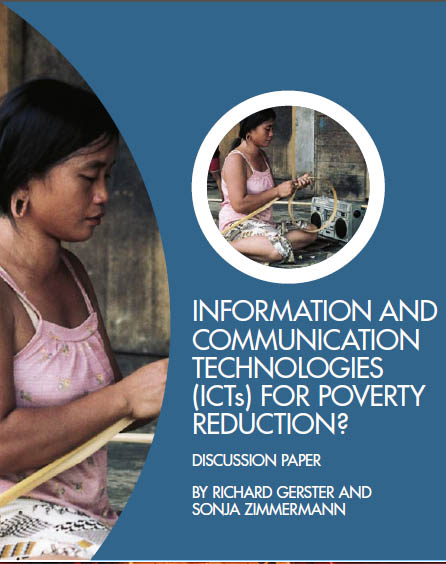 [2003] Poverty is seen as the opposite of well-being. Beyond a lack of income, the multidimensional concept of poverty also refers to disadvantages in access to land, credit and services (e.g. health and education), vulnerability (towards violence, external economic shocks, natural disasters), powerlessness and social exclusion.
[2003] Poverty is seen as the opposite of well-being. Beyond a lack of income, the multidimensional concept of poverty also refers to disadvantages in access to land, credit and services (e.g. health and education), vulnerability (towards violence, external economic shocks, natural disasters), powerlessness and social exclusion.
Information and Communication Technologies (ICTs) facilitate the creation, storage, management and dissemination of information by electronic means. This definition includes radio, television, elephone, fax, computer and the Internet. ICT applications in developing countries are often part of an overall strategy for economic growth, relying on the trickle down effect to those in poverty. The limitations of this approach are well known. Effective poverty reduction requires a more targeted approach.
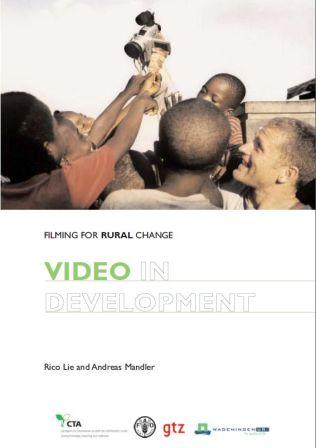 [2009] This book is about using video in rural interventions for social change. It gives a glimpse into the many creative ways in which video can be used in rural development activities, such as for training, awareness-raising, data collection or advocacy.
[2009] This book is about using video in rural interventions for social change. It gives a glimpse into the many creative ways in which video can be used in rural development activities, such as for training, awareness-raising, data collection or advocacy.Drawing on examples from development projects in South America, Africa and Asia, the book aims to encourage development professionals to explore the potential of video in development, making it a more coherent, better understood and properly used development tool. Specifically, it seeks to give decision-makers greater insight into the subject in order to support decisions on the strategic use of video in development.
Click here to access the French version of this document.
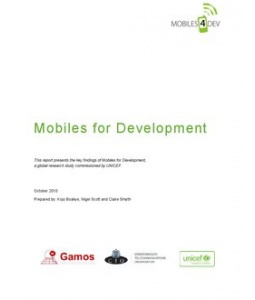 [2010] Mobiles4Dev is a research study commissioned by UNICEF to help understand the global mobile telephony landscape as it relates to advancing development, and as an area of significant future opportunities.
[2010] Mobiles4Dev is a research study commissioned by UNICEF to help understand the global mobile telephony landscape as it relates to advancing development, and as an area of significant future opportunities.The report gives an overview of the impact of mobiles on socio-economic development and how they can facilitate equity-based programming. It also highlights key trends in the sector, including mobile telephone and Internet usage, and common themes in mobile operators’ business strategy and corporate social responsibility.
Evidence from 14 country studies (Bangladesh, Egypt, Ghana, Iraq, Kosovo, Lao PDR, Malawi, Mongolia, Philippines, Sierra Leone, Sri Lanka, Suriname, Uganda, Zambia) suggest that mobile tools can provide cost effective interventions, overcome bottlenecks to services, and enable communities to maximize the impact of available resources.
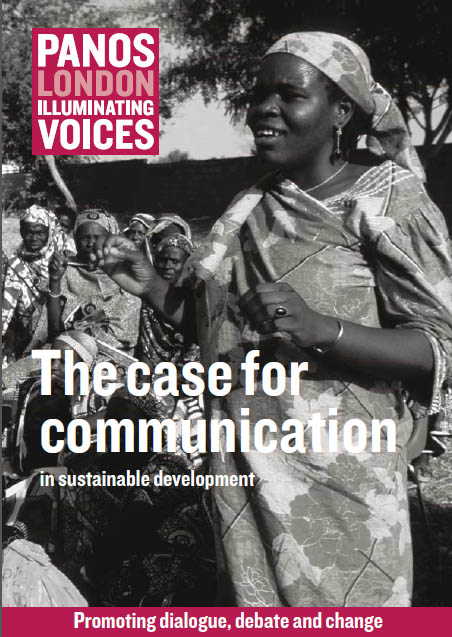 [2007] This paper addresses the challenge of using communication more powerfully as an agent of change to establish faster, more sustainable development.
[2007] This paper addresses the challenge of using communication more powerfully as an agent of change to establish faster, more sustainable development.After a short chapter setting out the context, it explores the roles information and communication processes play in all of the key elements that foster development:(1) in equitable and inclusive political processes; (2) in national and international governance processes that are effective, responsive and accountable; (3) in supporting engaged citizens and dynamic civil society; (4) in generating inclusive economic growth, sustainable livelihoods and transparent, efficient and equitable markets; and (5) in establishing and protecting a free, pluralistic media environment in which media outputs are many and diverse but also of high quality.
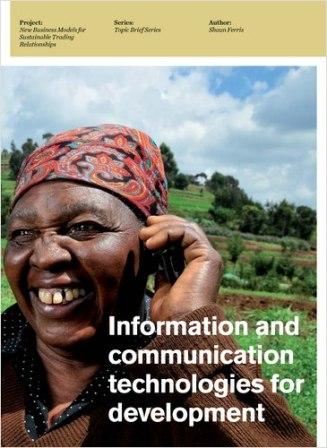 [2012] This paper asks “How is information and communication technology (ICT) being used in agricultural development?” It provides a snapshot of the types of ICT solutions that are emerging in agriculture for development and how these solutions are beginning to be used to fight hunger, reduce poverty, raise education, protect our environment and improve our health, all things we need to do in order to build a smarter global community.
[2012] This paper asks “How is information and communication technology (ICT) being used in agricultural development?” It provides a snapshot of the types of ICT solutions that are emerging in agriculture for development and how these solutions are beginning to be used to fight hunger, reduce poverty, raise education, protect our environment and improve our health, all things we need to do in order to build a smarter global community.Using case study examples, the paper outlines how ICT applications for the agriculture sector range from the highly sophisticated, fully-integrated chain-wide agri-business service packages used by the most commercial farmers, down to basic voice and text messaging that is being used very effectively by less resourced smallholder farmers and traders. To take advantage of this marketplace, the private sector, NGOs and governments are investing in a range of new tools to link farmers with assets, services and markets.
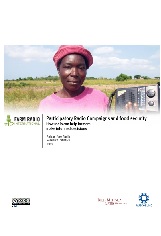 [2011] The African Farm Radio Research Initiative (AFRRI) was a 42-month action research project aimed to test the effectiveness of a new type of radio campaign developed by Farm Radio International: the participatory radio campaign (PRC).
[2011] The African Farm Radio Research Initiative (AFRRI) was a 42-month action research project aimed to test the effectiveness of a new type of radio campaign developed by Farm Radio International: the participatory radio campaign (PRC).Farmers participate are engaged in the development of the farm radio programming as central agents of the knowledge sharing process. A series of farm radio programs are designed to enable farmers to improve their agricultural practices and ultimately their food security. This report discusses the key findings from an evaluation of 15 PRCs developed by FRI with partner radio stations in five African countries – Tanzania, Uganda, Mali, Ghana, and Malawi.
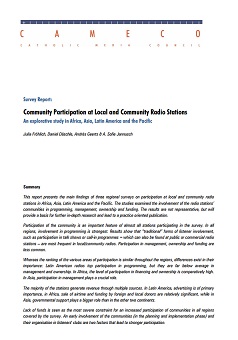 [2012] This report presents the main findings of three regional surveys on participation at local and community radio stations in Africa, Asia, Latin America and the Pacific. The studies examined the involvement of the radio stations’ communities in programming, management, ownership and funding. The results are not representative, but will provide a basis for further in-depth research and lead to a practice oriented publication.
[2012] This report presents the main findings of three regional surveys on participation at local and community radio stations in Africa, Asia, Latin America and the Pacific. The studies examined the involvement of the radio stations’ communities in programming, management, ownership and funding. The results are not representative, but will provide a basis for further in-depth research and lead to a practice oriented publication.Participation of the community is an important feature of almost all stations participating in the survey. In all regions, involvement in programming is strongest. Results show that “traditional” forms of listener involvement, such as participation in talk shows or call-in programmes − which can also be found at public or commercial radio stations – are most frequent in local/community radios. Participation in management, ownership and funding are less common.
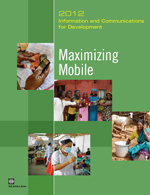 [2012] Developing countries are increasingly well placed to exploit the benefits of mobile communications, with levels of access rising around the world. This report analyzes the growth and evolution of applications for mobile phones, focusing on their use in agriculture, health and financial services, as well as their impact on employment and government. The emphasis is no longer on the phone itself, but on how it is used, and the content and applications that mobile phones open in development.
[2012] Developing countries are increasingly well placed to exploit the benefits of mobile communications, with levels of access rising around the world. This report analyzes the growth and evolution of applications for mobile phones, focusing on their use in agriculture, health and financial services, as well as their impact on employment and government. The emphasis is no longer on the phone itself, but on how it is used, and the content and applications that mobile phones open in development.In particular Chapter 2 examines the emerging uses of mobile services in agriculture, as well as remote and satellite technologies that are assisting in food traceability, sensory detection, and status updates from the field.
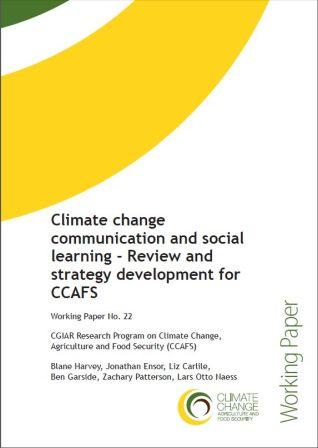 [2012] This working paper by CGIAR Research Program on Climate Change, Agriculture and Food Security (CCAFS) offers an overview of current theory and practice on climate change communication and social learning in the global South.
[2012] This working paper by CGIAR Research Program on Climate Change, Agriculture and Food Security (CCAFS) offers an overview of current theory and practice on climate change communication and social learning in the global South.With a view of informing CCAFS strategy in this area, it presents a theoretical framework for understanding social learning and communication approaches and reviews the current landscape of methods, tools and decision aids in communicating climate change in the context of development. It explores user needs and perceptions, reviews the challenges of communicating complex issues and scientific evidence as well as relevant local knowledge, includes case studies from the CGIAR network of institutions and finally provides recommendations for adopting a social learning approach to communicating climate change and adaptation.
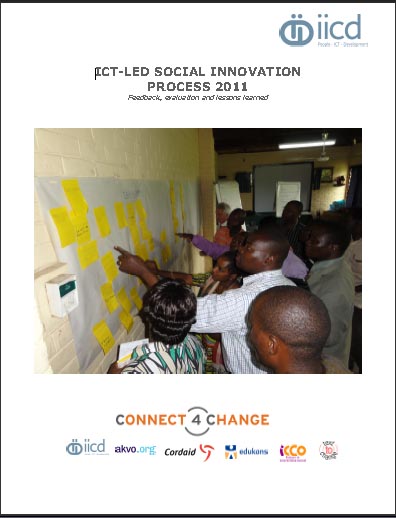 [2011] This report summarises feedback, evaluation and lessons learned when designing ICT for development programmes.
[2011] This report summarises feedback, evaluation and lessons learned when designing ICT for development programmes.
The ICT-based Social Innovation Process enables diverse stakeholders to set priorities for strengthening the sectors they have an interest in, shape their sector’s development path, and design how their organisations will use ICT tools to empower their staff and their beneficiaries to create positive change. From its inception, IICD has thus always regarded ICT as tools whose power can be harnessed by people in developing countries to shape their own development rather than technology being a goal.




